
1. "WH" Question
1.1. What?
1.2. When?
1.3. Where?
1.4. Why?
2. Greetings and Goodbye
2.1. Greetings
2.1.1. Hi / Hello
2.1.2. How's it going?
2.1.3. What's up?
2.1.4. Good evening
2.1.5. Good afternoon
2.1.6. Good morning
2.1.7. Welcome to (place)
2.2. Goodbye
2.2.1. Bye
2.2.2. Farewell
2.2.3. Take care
2.2.4. Have a nice day
2.2.5. See you
2.2.6. See you later
2.2.7. See you next time
2.2.8. See you tomorrow
2.2.9. See you very soon
3. Verbs
3.1. ............................
3.1.1. The verb is the part of speech or lexical category that expresses action or movement, life, achievement, status or condition of the subject; semantically expresses a complete preaching.
4. My Family
4.1. We know and learn the types of family there.
4.1.1. Paternal family
4.1.1.1. Great-Grandfather
4.1.1.1.1. Grandfather
4.1.1.2. Great-Grandmother
4.1.1.2.1. Grandmother
4.1.2. Maternal family
4.1.2.1. Great-Grandmother
4.1.2.1.1. Grandmother
4.1.2.2. Great-Grandfather
4.1.2.2.1. Grandfather
5. Alphabet.
5.1. Alphabet
5.1.1. The alphabet or the alphabet of a language or language is the ordered set of lyrics. It is also the group, which is read with a certain order, of the graphs used to represent the language that serves as communication system.
6. Adjective Possessive.
6.1. Types.
6.1.1. Before the noun.
6.1.1.1. my, my You, Yours, his, its, our / -os, our / -as, your / -os, your / -as his, its.
6.1.1.1.1. Examples.
6.1.2. Homework
6.1.2.1. Part 1
6.1.2.1.1. My story begins; there was a time I and my family went to my farm is in the thorn in my farm at par was our childhood friends when I saw the invite them to come to my farm to be a while and then went to the his farm, his parents got to see us happy. We burned to sleep in my house with my family to wake up to our vote went to his island cook and made a bonfire.
6.1.2.2. Part 2
6.1.2.2.1. My name is Jennifer Margarita Campos Blanco, my family consists of six people: my father, my mother, my two sisters and my grandmother. In our house we have a pet named Star. In our house is the church where we go and where my father preaches the word of God. My sisters are great fun and very upset them they have very serca of our house.
6.1.3. After the noun.
6.1.3.1. my own; mine; mine; mine, of yours; yours; yours; yours; his; his; his; his; our; our; our; ours; your; your; your; your.
6.1.3.1.1. Examples.
7. The numbers.
7.1. Learning numbers in English.
7.1.1. Numbers.
8. Jobs.
8.1. We investigated 20 jobs.
8.1.1. Judge, lawyer, Model, Surgeon, Soldier, Female professor, Writer, Mechanic, Firefighter, Hairdresser, Writer, Waiter, Cabbie, Tailor, Pastor, Sailor, Police, Stock agent, Plumber, Pilot.
8.2. We did 10 sentences asking:
8.2.1. Are you a judge?
8.2.2. No, I'm not.
8.2.3. Are you a lawyer?
8.2.4. Yes I am.
9. Time.
9.1. What time is it?
9.1.1. It is 10:00 Pm
9.1.2. The time is 8:05 Am
10. .................
10.1. Description.
10.1.1. Miguel is eating a ham and cheese bread.
10.1.2. Marta is eating an apple.
10.1.3. Rafael is eating bread chicken.
10.1.4. Ethel is reading a book.
10.1.5. Rodrigo is seeing Ethel reading the book.
10.1.6. Karen is taking her a picture of a crab.
10.1.7. Genesis this sosprendida because Karen is taking her a picture the crab.
10.1.8. Fernando is eating ice cream.
10.1.9. Rutn is getting sunscreen.
10.1.10. Estela is caring for her son Luis.
10.1.11. Noe is running to where his friends with his shovel to finish the castle.
10.1.12. Elena, Paty, Ema are waiting for Noah to finish the castle.
10.1.13. Romeo is bathing in the sea.
10.1.14. Vanessa is getting to bathe in the sea.
10.1.15. Reyna and Alex are looking for a place to sit.
10.1.16. Mario is reading a book.
10.1.17. Jennifer is on the phone.
10.1.18. Manuel is playing with his dog.
10.1.19. Sergio is talking with his father and in his hand is a ball.
10.1.20. Lucas is talking to his son Sergio.
11. Country / Nationality / Language
11.1. We saw the nationalities of the countries and the language of one of them.
11.1.1. What's your country?
11.1.2. What's your nationality?
11.1.3. What's your language?
12. "To be" (Ser/Estar)
12.1. The verb "to be" is the most important English and at the same time the most complicated verb. It is used as a main verb as an auxiliary verb it is irregular in the present and the past.
12.1.1. Affirmative (Afirmativo)
12.1.2. Negative (Negativo)
12.1.3. Interrogative (Interrogativo)
13. There is / There are
13.1. There is
13.1.1. There is a bed
13.1.2. There is a hammock
13.2. There are some shirts
13.2.1. There are pillow
13.2.2. There are
14. Color clothing
14.1. We learn to describe the color of clothing.
14.2. For the activity we use the PowToon
15. Demonstrative Pronouns
15.1. They can be singular and plural.
15.1.1. This (the / a / o).
15.1.2. That (the / a / o, one, that / a).
15.1.3. These (these / as).
15.1.4. Those (such / as those / as).
16. Prepositions
16.1. They are:
16.1.1. a, before, under, with, to, from, during, in between, except, to, to, by, for, by, except, as without, on and after.
17. Affirmative, negative and interrogative sentences
17.1. Affirmative sentences.
17.1.1. Subject + Verb + Direct Object.
17.2. Negative sentences.
17.2.1. Subject + Assistant denial + Verb + Direct Object.
17.3. Interrogative sentences.
17.3.1. Auxiliary + Subject + Verb + Direct Object.

